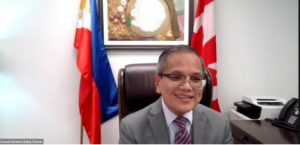PH Congen in Calgary: MOU signed, proposals submitted to help nurses practice in Alberta
PH Congen in Calgary: MOU signed, proposals submitted to help nurses practice in Alberta

PH Consul General in Calgary Zaldy Patron
By Michelle Chermaine Ramos
LJI Reporter
The Philippine Reporter
On October 6, 2022, the Philippine Consulate General in Calgary signed a Memorandum of Understanding with the Alberta government on the recruitment of Filipino nurses. This initiative is part of the larger Credentials Recognition Project of the Philippine Embassy in Ottawa and the Philippine Consulates General in Calgary, Toronto, and Vancouver which was spearheaded by Ambassador Adolfo Robles during his time in Canada.
“I know many got excited because it’s so novel. We were the only country that made these proposals to the Alberta government and that made the Alberta government rethink and review its policy for the IENs (Internationally Educated Nurses), because if they accept the proposals of the Philippines for financial assistance, then they will have to set aside a budget,” said Consul General Zaldy Patron of the Philippine Consulate General in Calgary.
He started advocating for this agreement around February 2021 and met with various Ministers of Health, Labour and Immigration, and Advanced Education as well as the College of Registered Nurses of Alberta (CRNA), the National Nurses Assessment Service (NNAS), and Mount Royal University to propose the delivery of the nursing bridging program in the Philippines.

Alberta Premier Jason
Kenney
“Even before I went to Premier Jason Kenney, I had already met all the ministers and the CRNA, the NNAS and MRU. They already knew our advocacy, so it was easy for the Premier when we called a meeting. Everyone understood what we were proposing to Alberta,” he said in our Zoom interview.
Consul General Patron met with former Alberta Premier Jason Kenney on October 6, 2022, to sign the MOU during a press conference. That same day, the MOU was signed by Undersecretary of the Department of Migrant Workers Patricia Yvonne Caunan, in Frankfurt, Germany. “On the Alberta side, Premier Kenney showed decisive leadership because he rallied his three ministries. The Ministry of Labor and immigration, the Ministry of Advanced Education, and the Ministry of Health to finalize this MOU and they came up with this bursary program that was announced on October 6. It was the last working day of former Premier Kenny as Premier, so it was a photo finish,” said Consul General Patron.
In Alberta, Mount Royal University is the only school that offers the full Nursing Bridging Program. Unfortunately, the many fees can be out of reach for new immigrants. The NNAS requires $3,000–$4,000 and the RNAP test costs about $1,800. The full program can cost $10,000 and MRU has a four-year wait time for admission since it can only take 120 students at a time.
THE PROVISIONS OF THE PHILIPPINES–ALBERTA MOU
1. The streamlining of the licensing and assessment process
Alberta has decided to increase the number of seats for the Nursing Bridging Program at Mount Royal University. The Ministry of Advanced Education announced that it will provide additional funding to increase the number of seats in the program to shorten the wait times for admission not just for Filipino nurses, but other internationally educated nurses already in Alberta as well.
Nurse Navigator Platform
Once launched, the Nurse Navigator Platform will be a one-stop shop online resource were IENs can access information regarding the assessment, testing, the Nursing Bridging Program, as well as the immigration pathways available to them whether they can go to Alberta as temporary foreign workers or under the Alberta Nomination Program.
Alberta will also be hiring nurse navigators who will offer Filipino IENs advice if they need assistance with their application for assessment, for licensing, the Nursing Bridging Program as well as immigration.
2. The potential delivery of Nursing Bridging Program in the Philippines through accredited Philippine institutions
The Alberta Ministry of Advanced Education and the Commission on Higher Education of the Philippines will later meet to discuss the technical details of how to deliver this program and which Philippine institutions are interested and qualified to offer it.
In addition to Alberta increasing the number of seats at MRU to increase the intake of students in the nursing bridging program, if Alberta will agree to deliver the bridging program in schools in the Philippines, then Filipino nurses can take the courses over there prior to coming to Canada so that will reduce the competition for spots at MRU.
“So, out of the 10 [courses] for example, that are required by MRU, maybe eight of them are theoretical subjects and then the two are practicum. So they can take all the eight there and then when they come here, they will just take the practicum,” said Consul General Patron.
This means that Filipino nurses will hopefully not have to compete for spots at MRU and wait four years just to be able to enroll. Additionally, offering courses in the Philippines will be more affordable and accessible.
3. The Alberta government will provide financial incentives for nurses already in Alberta who would like to undergo the credentialing process as well as the Nursing Bridging Program
The Alberta government announced a bursary program worth $3.5 million in financial assistance for all internationally educated nurses. Thus, this agreement proposed by the Philippines is opening doors for all foreign trained nurses in Alberta who immigrated from other countries as well.
“According to the Advanced Education Minister, it can be equivalent to about $15,500 per IEN (Internationally Educated Nurse). This $15,500 can be used to pay for the assessment fee, for the testing fee, as well as the nursing Bridging Program and Alberta will be coming out with the Nurse Navigator Platform,” said Consul General Patron.
4. The recruitment of Filipino nurses to Alberta can be done through a government-to-government arrangement
This will be cheaper for Alberta employers since they won’t have to pay a Philippine recruitment agency. It will also be safer for Filipino nurses because they won’t have to worry about being overcharged by recruiters.
Some raised concerns about the possible mass exodus of nurses from the Philippines but this will not be an issue because the Philippine government caps the number of nurses allowed to work overseas every year, depending on the country’s needs. Right now, the number stands at 7,500 Filipino nurses which can increase or decrease depending on the Philippines’ healthcare needs.
Consul General Patron explained that first, the Alberta government needs to tell them how many nurses they need in which positions and the required qualifications so that an agreement with specific details can be proposed. Only then can the Philippines start hiring Filipino nurses through the Philippine Overseas Employment Administration that will issue press releases to inform the public about potential employment opportunities in Alberta once the details are confirmed.
Does the MOU include nurses working in other countries overseas?
“It’s stated in the MOU that the recruitment will be done in the Philippines. Now if they’re willing to go to the Philippines or coordinate with POEA (Philippine Overseas Employment Administration), if they will be qualified, it will be up to the POEA because that is the recruitment part. So again, that’s the details and the details are not yet there. The implementation part is not yet there. Once POEA has come up with its implementing guidelines on how to do the recruitment, then you will know whether POEA will only be hiring from the Philippines, or if even nurses from other countries can be allowed, but they will have to go through POEA before they come here,” Consul General Patron explained.
Comments (0)